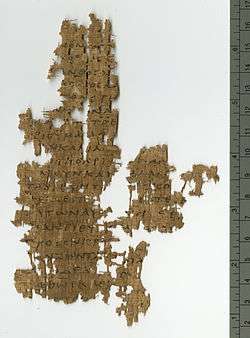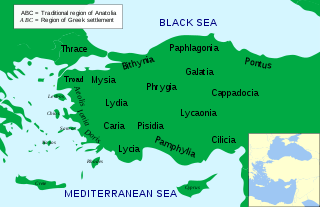1 Peter 1
1 Peter 1 is the first chapter of the First Epistle of Peter in the New Testament of the Christian Bible. The author identifies himself as "Peter, an apostle of Jesus Christ", and the epistle is traditionally attributed to Peter the Apostle, but there are hypotheses that it is a work of Peter's followers in Rome between the years 70 and 100.[1][2][3]
| 1 Peter 1 | |
|---|---|
← James 5 | |
 Fragment containing 1 Peter 1:23–2:5 on Papyrus 125 (3rd/4th century). | |
| Book | First Epistle of Peter |
| Category | General epistles |
| Christian Bible part | Page shown right side is from 2 Peter 1 not 1 Peter 1 |
| Order in the Christian part | 21 |
Text
The original text was written in Koine Greek. This chapter is divided into 25 verses.
Textual witnesses
Some early manuscripts containing the text of this chapter are:
- Papyrus 72 (3rd/4th century)
- Papyrus 125 (3rd/4th century; extant verses 23–25)
- Codex Vaticanus (325–350)
- Codex Sinaiticus (330–360)
- Codex Alexandrinus (400–440)
- Codex Ephraemi Rescriptus (ca. 450; extant verses 3–25)
- Papyrus 74 (7th century; extant verses 1–2,7–8,13,19–20,25)
Old Testament references
Greeting (1:1–2)

Verse 1
- Peter, an apostle of Jesus Christ,
- To the pilgrims of the Dispersion in Pontus, Galatia, Cappadocia, Asia, and Bithynia,[5]
The specific region named in this verse would cover most of Asia Minor north and west of the Taurus mountains, which was attested in Pliny's letters to Trajan (c. 112 CE) to have a significant number of Christians in towns and countryside of the area.[6]
God's plan of salvation meets believers' every need (1:3–9)
This part contains a form of blessing, which not only praises God, but lays out the main themes of the epistle.[6] Peter follows the pattern of some of Paul's epistles in pouring thanksgiving to God for His blessings, and gives eleven reasons for praising God:[7]
- He is the Father of Lord Jesus Christ (verse 3)
- He has given new birth (cf. John 3:1–8; verse 3)
- the motive for giving the new birth is his mercy (verse 3)
- the result of the mercy is a living hope (verse 3)
- the means to this hope is the resurrection of Jesus (verse 3)
- the object of this hope is an inheritance (verse 4)
- this inheritance cannot be destroyed by hostile elements nor defiled by outside pollution, and cannot fade by wasting from within (verse 4)
- this inheritance is kept in heaven for the believers (verse 4)
- the believers are shielded ("garrisoned") for the inheritance by the power of God (verse 5)
- the means of the shielding is faith (cf. Ephesians 6:16) to hold on to the promises of God (verse 5)
- the final goal is a salvation to be revealed by God in the last time, when Jesus is revealed (verse 5, 7).[7]
How the salvation was made known to the believers (1:10–12)
The salvation is made known by the work of the Holy Spirit (verse 12), which is the Spirit of Christ (verse 10), who led the prophets to foretell the grace that was to come (verse 10), even to foresee the sufferings of Christ and the glories that would follow (verse 11; cf. Psalm 22:7–8; 22:17–18; Isaiah 53; Lamentations 1:12), but not to find out when and how that would happen.[7]
Redemption into the Christ Group (1:13–21)
The addressees are said to be set apart for God from the surrounding culture, into the holiness.[8]
Verse 16
- because it is written, "Be holy, for I am holy."[9]
Citing: Leviticus 11:44, 45; 19:2; 20:7[10]
Rebirth through the Word (1:22–2:3)
Those undergone rebirth could be described as 'newborn infants' (1 Peter 2:2), entering the new community of redeemed people of God constituted by the word or the good news of God.[8]
Verses 24–25
- 24For
- All flesh is as grass,
- and all the glory of man as the flower of grass.
- The grass withers, and its flower falls away,
- 25but the word of the Lord endures forever."
- All flesh is as grass,
- This is the word that was preached to you.[11]
Citing: Isaiah 40:6–8.[12]
See also
- All flesh is grass
- Anatolia
- Bithynia
- Cappadocia
- Galatia
- Jesus
- Pontus (region)
- Saint Peter
- Related Bible parts: Leviticus 11, Isaiah 40, Romans 12, Galatians 5
References
- Eve 2007, pp. 1263–1264.
- Davids, Peter H (1982). I. Howard Marshall and W. Ward Gasque (ed.). New International Greek Testament Commentary: The Epistle of James (Repr. ed.). Grand Rapids, Michigan: Eerdmans. ISBN 0802823882.
- Evans, Craig A. (2005). Craig A. Evans (ed.). Bible Knowledge Background Commentary: John, Hebrews-Revelation. Colorado Springs, Colo.: Victor. ISBN 0781442281.
- Coogan 2007, p. 396 New Testament.
- 1 Peter 1:1 NKJV
- Eve 2007, p. 1264.
- Wheaton 1994, p. 1374.
- Eve 2007, p. 1265.
- 1 Peter 1:16 NKJV
- Note on 1 Peter 1:16 in MEV
- 1 Peter 1:24 MEV
- Note on 1 Peter 1:25 in MEV
Sources
- Coogan, Michael David (2007). Coogan, Michael David; Brettler, Marc Zvi; Newsom, Carol Ann; Perkins, Pheme (eds.). The New Oxford Annotated Bible with the Apocryphal/Deuterocanonical Books: New Revised Standard Version, Issue 48 (Augmented 3rd ed.). Oxford University Press. ISBN 9780195288810.
- Eve, Eric (2007). "77. 1 Peter". In Barton, John; Muddiman, John (eds.). The Oxford Bible Commentary (first (paperback) ed.). Oxford University Press. pp. 1263–1270. ISBN 978-0199277186. Retrieved February 6, 2019.
- Wheaton, David H. (1994). "1 Peter". In Carson, D. A.; France, R. T.; Motyer, J. A.; Wenham, G. J. (eds.). New Bible Commentary: 21st Century Edition (4, illustrated, reprint, revised ed.). Inter-Varsity Press. pp. 1369–1385. ISBN 9780851106489.
External links
- 1 Peter 1 King James Bible - Wikisource
- English Translation with Parallel Latin Vulgate
- Online Bible at GospelHall.org (ESV, KJV, Darby, American Standard Version, Bible in Basic English)
- Multiple bible versions at Bible Gateway (NKJV, NIV, NRSV etc.)